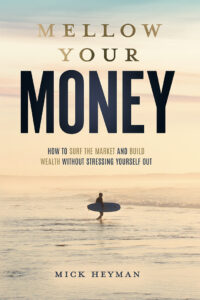Writer Mick Heyman joins me today to chat about his non-fiction finance book, Mellow Your Money.

Bio:
Mick Heyman, CFA, is the author of Mellow Your Money: How to Surf the Market and Build Wealth without Stressing Yourself Out and the Founder of Heyman Investment Counseling. With a distinguished 40-year career in wealth management, Mick has built a reputation for helping individuals and institutions grow and preserve their wealth through a stress-free approach to investing.
Mick began his career at a small firm in Cincinnati before advancing to a role in Louisville, where he managed equity portfolios for a prestigious team overseeing billions in assets. Eventually, he transitioned to San Diego, where he now works closely with individual investors, some of whom have been with him for over three decades. Mick holds a bachelor’s degree in economics from Northwestern University and is a Chartered Financial Analyst (CFA). Although his formal education is in economics, Mick’s passion for philosophy and psychology has greatly influenced his understanding of market dynamics, emphasizing the role of human emotion in financial decision-making.
In addition to his book, Mick shares his insights on sound money management through articles on LinkedIn and has been featured in the Wall Street Journal and other financial publications. His work highlights the importance of a balanced approach to wealth, viewing financial health as integral to overall well-being. Residing in San Diego, Mick enjoys an active lifestyle, engaging in tennis, golf, surfing, and practicing meditation, yoga, and qigong. He also has a deep appreciation for mystery novels and Russian literature. To learn more about Mick’s approach to investing, visit mellowyourmoney.com.
Welcome, Mick. Please tell us about your current release.
What I hoped to accomplish with “Mellow Your Money” is to help investors learn from my experiences and misadventures in the investment markets and in my life that have helped me reduce my stress regarding investing. My goal was to pass these lessons on in hopefully a fun and interesting way.
Though we all have unique roads to travel in life, most of us struggle with emotional and psychological challenges when it comes to money and building wealth. Learning to overcome these obstacles and changing our money mindset is how we grow rich—both as investors and as human beings.
Some thoughts I touch on in the book are as follows:
- How self-reflection and self-awareness are crucial to building financial success.
- Why it’s more effective to grow your money with long-term investing and how doing less can mean earning more.
- How to tell the difference between real and perceived risk, so you don’t go chasing waterfalls over a cliff.
- How to profit in a counterintuitive market by shutting off the noise in the media.
- Why money, like surfing, is about learning how to step into liquid while keeping your eyes on dry land.
What inspired you to write this book?
Often as we look back in our life we can see how our experiences weave together to have helped us grow and if we keep that growth mindset then even the most difficult experiences can eventually lead us to a better place. My experience in the markets just happens to have been the fruitful ground for me to express the lessons I learned and hopefully help others as they grow not only as investors but in all aspects of their lives. I have also been most helped by learning through storytelling and that is how I hoped to teach about the markets.
Excerpt from Mellow Your Money:
WAR? Who wrote down ‘war’?!” And the speaker looked around the room implying some idiot wrote down war.
I was the idiot in question. I slunk down in my seat. I was attending an economists’ luncheon and though I was no great fan of economists, I found every bit of information potentially valuable. And it was usually fun to gather with other advisors, especially whenever someone else agrees to pick up the tab. So I went, thinking to have a nice lunch and expand my knowledge without making a fool of myself. I had apparently failed on that score.
Fred was a celebrated economist visiting Louisville to share his views on the future of the economy and the market. He had passed around notecards and asked us each to write down where we thought interest rates and other market signposts might end up by the end of the year. He also asked us to write down what we thought might be the biggest surprise of the year. On my notecard, I wrote ‘war’ and for some reason that really tickled the expert.
“War! Boy, that’s a new one,” Fred chortled from his seat. “I ask this question everywhere I go, and believe me that’s a lot of places, and nobody has ever come up with war. Boy, that is rich,” and then he paused—another pause! The silence seemed to go on for minutes, everyone looking around and it became obvious he wasn’t giving up until he found me, so I raised my hand. About 20 faces turned toward me, half in astonishment, half relieved that the idiot was me and not them.
“Were you joking?” Fred asked me, drawing his syllables out long and then clipping them up at the end like a fishhook. “How do you imagine a war happening in America this year? Maybe you were envisioning something abroad? Like Chile or Argentina?” Everyone stared, waiting for my answer. I began to sweat. I couldn’t take the easy road out Fred had offered me. I couldn’t have located Argentina or Chile on a map if you paid me.
Thankfully, after my own excruciatingly long pause, a pause my boss would have been proud of, the simple answer came to me. “Well, Fred, you asked for a surprise, didn’t you?” I flashed him my sincerest smile. “I have no idea why we would end up in a war. That’s why it would be a surprise.” Mercifully, Fred moved on. He’d had his fun with me, and I was forgotten. I’m pretty sure, though, that many in that room will have thought back to that awkward moment when, three months later, in September of that very year, the planes hit the World Trade Center and America went to war.
What exciting project are you working on next?
I have this funny thought that the whole concept of “Mellow Your Money” could be morphed into so many other ways of mellowing like “Mellow Your Dating” or “Mellow Your Politics” or “Mellow Your kids.” I certainly have plenty of lessons from my misadventures in all of these areas…Who knows? Maybe mellowing of America would not be such a bad thing…

When did you first consider yourself a writer?
I was not a very good athlete but I loved sports and so I began writing about them in high school. My favorite journalist was Jim Murray who could put a funny and wise spin on so many different athletes and sporting events and I tried to mirror him in my writing about our high school sports. Often I was the one I poked the most fun of but most people enjoyed my self deprecating humor and I tried to keep that light tone as I write about the markets and investing.
Do you write full-time? If so, what’s your workday like? If not, what do you do other than write and how do you find time to write?
I still work as an investment advisor so that keeps me busy. My writing as slowed down as I have been enjoying doing these interviews and podcasts to both promote the book as well as pass on the message that drowning out the constant noise of social media and headlines is possible and so valuable in managing our money. And in addition, that learning about ourselves is a key element to being successful as a long term investor. Though I won’t know for some time how well the book does, I have found much interest in these messages from a vast number of people and so it feels gratifying that at least the message is getting out.
What would you say is your interesting writing quirk?
Different than most financial writers I believe the best lessons are learned through human connection and in the trenches of experience and as readers will see from the anecdotes in the book, it’s my long-held interest in literature, psychology and philosophy that have helped me to understand the market in a uniquely human way. Though we all have different paths, the emotional highs and lows that they produce are common to us all. Though money is not usually a fun or funny topic I believe that my most unique quirk is to pass on my lessons as a fun adventure and importantly, hope to pass on the thought that if we focus on learning lessons from our experiences and misadventures, in and out of the market, our lives can become enriched and so can our finances.
As a child, what did you want to be when you grew up?
I used to say I wanted to be an author and a scholar. I guess I imagined myself to be wise and to help write and preach about my wisdom. What I did not imagine is that I would do best as a humble, self deprecating character that somehow found truth and was able to grow from his experiences and misadventures in the market and in his life. Sometimes it was the experiences in the market that taught a valuable lesson about investing and maybe about life too or sometimes it was an experience in my life that taught me not just how to be a better person but also be a better investor. Eventually I learned the most from stories rather than from a preacher or a textbook and so this is how I present what I consider the most valuable lessons about investing. If someone is looking for a textbook, this is not that. But if you enjoy a good laugh and can imagine yourself in some of the interesting situations that I experienced, then you too can learn some helpful lessons that can make your money grow in the long run.
Anything additional you want to share with the readers?
I believe most people believe that investing and money is all about numbers and yet in my book readers will see how numbers are far from what we need to know about how to become good investors. In fact, I was so bad at numbers I was once shown by a statistics professor the terrible odds I was facing to pass his course and my best path was to the drop office. It was a surprise to me and maybe will be for readers that my curiosity and interest in literature, philosophy, psychology, eventually history, along with self analysis, that taught me the most valuable lessons about investing and in this same way taught me such valuable lessons about my life.
Links:
Website | Amazon author page | Amazon buy link | Instagram | Facebook | LinkedIn
